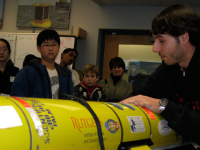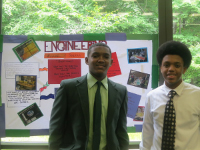COSEE NOW and Data in the Classroom
| |  |
| Middle school students learn about gliders as part of Rutgers University Science Saturday program |
Through its collaboration with the Ocean Observatory Initiative (OOI) and the Integrated Ocean Observing System (IOOS), COSEE NOW has been focused on taking a systems approach to learning about the ocean using real scientific data. Research suggests that providing students with learning experiences that enhance their abilities to recognize meaningful patterns of information is essential for building critical thinking skills (e.g., Simon, 1980; Bransford et al. 1989).
Our goal is to design easy-to-use curriculum activities and simple, intuitive computer interfaces for accessing online data. In particular, COSEE NOW PIs are working to make the data from ocean-observing technology, such as gliders, high-frequency radar, satellite imagery, and sea-floor sensors, available for use in both formal and informal learning activities. Ocean-observing data is accessible online through the Rutgers University Coastal Ocean Observation Laboratory (COOLroom) and soon through the OOI.
As part of this initiative, the Liberty Science Center has piloted a science residency program with high school students that use data visualizations and applications from the COOLroom. The Ships, Ocean, and Satellite activity helps students interpret data to describe the pattern of sea surface temperature, gain a basic understanding of data resolution, and learn about limitations associated with random sampling. Sea 3D is another activity designed to provide students with the skills necessary to interpret real time data and false color images.
The COSEE NOW team, led by Kate Florio, also is developing a Real-Time Data Framework that categorizes the different levels of student engagement with data; provides examples of how different types of data fit into education; and shows educators a pathway to increasing learner data literacy. The Framework is intended to provide many resources:
- Suggested techniques and pathways to effectively integrate data activities for educators who have not taught with data
- A guide for selecting lessons and activities appropriate for their students’ current level of data literacy for educators who already teach with data
- A suggested structure of how to create lessons that are focused on specific learning objectives and are matched with appropriate data sets and visualizations for content developers
- A roadmap for creating real-time data training programs for educators for professional development providers.
COSEE NOW will be offering a series of webinars with data for interested colleagues within the COSEE, IOOS, and OOI communities to review this Framework. Please contact Kate Florio if you are interested in being a reviewer/partner.
 | |
Underserved students from Paterson NJ participated in a residential summer science program, where they worked with glider data and developed a poster on their experience. The posters were shared with scientists, family, and friends highlighting what the students learned from a week of lab and field experiences. | |
Scientist-Educator Partnerships
COSEE NOW is continuing to work on creating a virtual workspace for K-12 and informal educators and scientists to collaborate on programs, products, and services that contribute to Ocean Literacy. The COSEE NOW website assists scientists in finding potential partners who can help fulfill their Criterion II Broader Impacts requirement in proposals and provides access to effective instructional techniques. The COSEE NOW website also enables both formal and informal educators to share education/outreach techniques, lesson plans, data visualizations, and media presentations that relate to current coastal and ocean research, and ocean observing systems data in particular. Beyond the individual benefits, the COSEE NOW website fosters collaborations among scientists and educators, enabling interdisciplinary communications and partnerships. Please join today.
Broader Impacts Wizard Goes Public
This spring the COSEE NOW Broader Impact Wizard went live and is available for use. The Wizard guides research scientists through some of the recommended components for a focused statement that satisfies the Criterion II Broader Impacts requirement of a research proposal. The goal of this “smart” software is to help identify target audience(s) and develop an appropriate plan, including education and outreach activities, a budget, project objectives, and an evaluation strategy. Research scientists are provided with a summary report that combines the information they entered with additional support information, such as relevant connections to educational research literature and effective practices. Please check out the software and provide comments to Dr. Carrie Ferraro.
Visit COSEE NOW!

